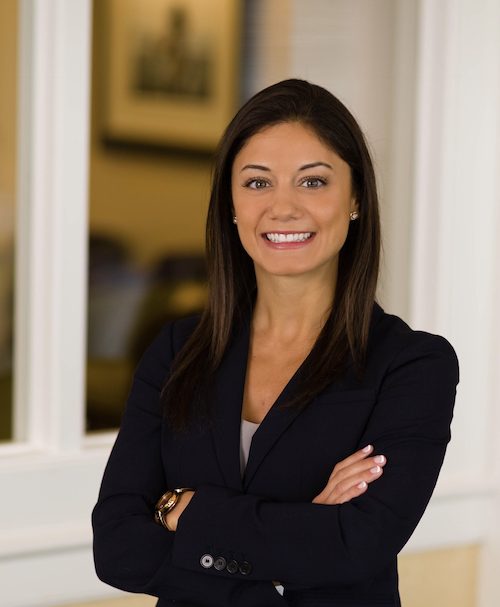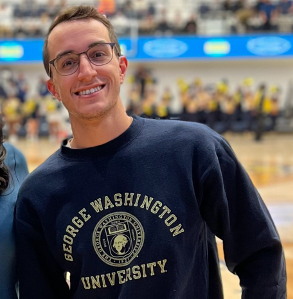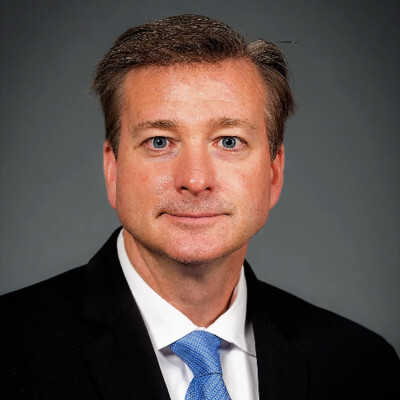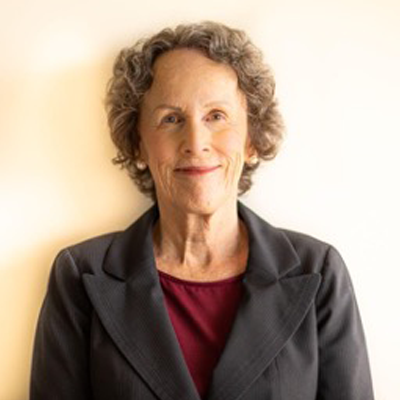Alumni Spotlight: Test
Jacqueline DerOvanesian, JD '16

What made you decide to apply to be a member of the GWLAA board? Have there been any particularly rewarding or challenging experiences serving on the board?
I loved being a GW Law student, and part of a community of people who were so enthusiastic and friendly. I met some of my best friends and created many of my favorite memories there. Even though I now live in Miami, I wanted to remain connected to the GW Law community and to the faculty I learned so much from. The GWLAA Board is a great way to stay involved with the latest issues affecting the school, and to work with the faculty and my former classmates. I also noticed that there is a large and increasing population of GW Law alum’s in my area who are interested in connecting with each other, and saw serving on the board as a good opportunity to help create regional networks outside of Washington, DC.
Is there a class or experience during your time as a student at GW Law that you found particularly helpful or impactful?
The unique work opportunities while in school during my second and third years were really incredible. Sitting through a morning of classes with top-notch faculty and then walking straight from the classroom to my internships at the DOJ Office of the Pardon Attorney and the FBI made for an experience I could not get anywhere else.
I also really enjoyed my experience on the mock trial and moot court boards. It gave more practical context to the research, writing, and argument drafting skills I learned in class, and was a lot of fun.
Outside of the classroom, I had always had a great time with the GW Law Running Club. A group of about a dozen of us, sometimes joined by a professor, would go for long runs every week and explore different parts of the city.
If you could go back in time, what advice would you give to yourself as a 1L?
Do not feel pressure to have your whole career planned on your first day of law school, or to take the same path as your peers. Take advantage of the wide range of faculty expertise, explore different work opportunities, and allow yourself to find your niche.
Previous Spotlights
Olajumoke "Jummy" Obayanju, JD '16
Olajumoke "Jummy" Obayanju, JD '16, is the President of the Association of Black Law Alumni and Director of the Congressional Black Caucus Foundation, National Racial Equity Initiative.
Could you talk about your experience as a student at GW Law? Please share memories featuring faculty or staff that made your experience at GW Law a good one.
It’s hard not to think of the indelible faculty and staff who’ve poured into my professional and personal development over the years, many of whom I am honored to still call friends today. There’s my 1L Legal Research and Writing professor, Alessandro Terenzoni, who passionately challenged me as a legal writer and inspired my path in public interest law. There’s my former clinic supervisor and professor, Dean Laurie Kohn, who propelled my family law advocacy and litigation skills and enhanced my critical thinking instilling in me confidence to be a better lawyer. As a Black woman I especially value the support I received from the Black women faculty and staff who often reassured me that I was in the right place—whether it was Bobby Walis giving me a quick pep talk in between classes or my former public interest counselor, Tamara Devieux-Adams helping me secure multiple internships, or Dean Renee DeVigne opening her door for evening talks to guide me through a career decision. As I reflect on my GW Law experience, I am reminded that the institution must not only prioritize the collective voices of diverse students, but also uphold a commitment to a community culture that maintains and values diverse faculty and staff.
What motivated you to continue your engagement with GW Law after graduation, and what led you to become the President of the Association of Black Law Alumni (ABLA)?
My engagement with GW Law is driven by my engagement with the Black Law Student Association (BLSA) and the Association of Black Law Alumni (ABLA). In fact, my dedication to our GW Black community dates to my 1L year, when I volunteered for the Patricia Roberts Harris dinner and then served as BLSA 1L Coordinator for our local chapter. In my second year, I served as DC/MD Sub-Regional Director for the MABLSA regional chapter. When I graduated in 2016, I knew I wanted to remain involved, but was not yet prepared to commit, so I just decided to become an active member of ABLA. A year later, I ran for the vice-president seat. I care deeply about GW Law, but at the core I care about GW Black law students and GW Black law alumni. I care about the Black law student who doesn’t see a familiar face in his or her classroom, or the Black alumni who are disengaged from the GW Law community and are considering how to support the school. My desire to uplift our Black alumni community aligns with the work that I do day-to-day as a racial justice attorney—to elevate opportunities for our Black law students and alumni community.
What is your vision for the future of ABLA?
Since ABLA’s establishment in 1988, it has risen as a prominent GW Law alumni affinity group, ensuring its voice is heard on policies that affect the law school. Over the years, ABLA has held hundreds of professional, social, and academic events for students and alumni, cultivated a community to encourage mentorship for both alumni and GW BLSA, and served an integral role in the recruitment efforts for increasing the number of Black law students and faculty. In 2020, we launched our Funding Firsts, Funding the Future Campaign aimed at raising $75,000 for the Jeanette A. Michael Scholarship Fund. We are already over halfway towards our goal with $44,000 raised. During the Covid-19 pandemic, we’ve held several virtual panels and mixers connecting ABLA members across the nation. We also launched our Theory & Practice, Virtual Brown Bag Series to highlight GW Law Black faculty expertise and increase alumni-faculty engagement. And recently, ABLA spearheaded the creation of the inaugural GW Law Public Interest Advisory Council that will support the GW Law Public Interest Program, advise the Dean, advocate, and fundraise for public interest scholarships. Standing on the foundation of the leadership before me, my vision is to uphold the great work we’ve already accomplished, increase ABLA’s multigenerational alumni participation, embolden administration to center Black voices within the law school, improve the Association’s professional development offerings, enhance our community service efforts, and build ABLA to become the leading resource of all things Black GW Law.
In your opinion, what are the next steps for GW Law, and how can the institution continue to improve for future generations?
As an alumna working in the public interest sector, I believe that GW Law has an opportunity to enhance its Public Interest programs. Because GW is uniquely positioned in the heart of DC it gives the law school a significant advantage compared to other law schools in the area. From experience, finding employment in public interest roles is often more challenging than finding work in the private sector, and if GW Law can commit to establishing a vibrant, active, and visible public interest identity this would greatly improve the experience and prospects for future generations. Specifically, I recommend that the institution prioritize diversifying its faculty and curriculum offerings to align with the 21st century public interest legal landscape, establish resources to build student and alumni connections in the community, and raise funds that exclusively support public interest placements, internships, and convenings. I am thrilled at the establishment of the inaugural Public Interest Advisory Council and look forward to the developments under the new leadership of Dean Dayna Bowen Matthew.
Adam Bofill, JD '17

Photo of Adam Bofill
What inspired you to get involved with GW Law following graduation?
My experiences as a student at GW Law inspired me to get involved with the school after graduation, along with a gentle push from friends that were already involved in various alumni programs and volunteer work. As a student, I had many opportunities to interact with legal professionals, many of whom are GW Law alumni. These interactions were invaluable learning experiences for me, both from a personal and professional standpoint. I wanted to provide similar opportunities to existing and future GW Law students.
Tell us about the work you are currently doing for Alumni Association and how do you hope this work continues moving forward?
I am currently a co-chair for the Alumni Association’s Alumni-Admissions Committee, along with my good friends and co-chairs Jake Berdine, JD ‘15 and Matthew Rosenberg, JD ‘16. Together, and with the help of our fellow alumni on the committee, we run the Admitted Students Outreach Program. The main objective of this program is to have GW Law alumni volunteers contact admitted students and answer any questions they may have about GW Law, DC, and/or law school in general. Our goal for the 2021-2022 admissions cycle is to contact at least half of the admitted students (over 1,000 admits), and I am happy to report that we are on pace to meet that goal with the help of 70+ alumni volunteers.
Is there a class or experience during your time as a student that helps you in your career?
Two of my favorite classes that have helped me with my career so far are IP Licensing with Professorial Lecturer in Law David Kacedon and Negotiations with Visiting Professor of Law Robin Juni. These two classes taught me practical legal skills that I use on a daily basis. In fact, I use negotiation skills that I learned from Professor Juni’s class outside of work as well. Although unrelated to my career, I am also very thankful I took former Professor Buchanan’s Federal Income Tax class, especially when filing my tax returns.
Sean Sabin, LLM '03

Photo of Sean Sabin
This month, Sean Sabin, Vice President and General Counsel of Raytheon Missiles and Defense, sat down with members of the Government Procurement Program to discuss his career path and experience at GW Law.
John W. Hunter, JD ‘72

John W. Hunter
Class of 1972 50th Reunion Committee Member
Can you tell us more about your career path after law school?
My first position after graduation was with the Federal Communications Commission. I continued as a telecommunications lawyer with the Washington office of a telecom company, and as a member of two law firms. I then joined a telecom trade association as a department head and counsel, and became Counsel to a House of Representatives Committee. After that, I returned to the FCC as Chief of Staff to a Commissioner, and remained at the Commission until January 2020. Interspersed among those positions, I was Chairman of the Virginia Public Broadcasting Board under three Governors, and served on the Fairfax County Planning Commission for four years. I am currently Vice President of the Foundation for Law and International Affairs.
Is there a class or experience during your time as a student that helped you in your career?
Professor Arnold Reitze’s many Environmental Law classes were particularly helpful in learning the intricacies of administrative law through the perspective of the emerging environmental regulatory law field. Also, Dean William Wallace Kirkpatrick ’s Antitrust Law classes gave me a deeper understanding of antitrust when later regulating corporations in the telecommunications industry.
If you could go back in time, what advice would you give to yourself as a 1L?
Take full advantage of learning everything you possibly can in your current position and concentrate on producing the best work product possible. Yes, have your eye on the next position, but don’t lose sight of where you are at the present time.
What are you most looking forward to about your upcoming class reunion?
Fifty years is a long time! I have stayed in touch only with a few classmates, so it will be great to meet and socialize with those I haven’t seen in many years at this end of our careers.
Anything else we have missed that you want to share with us? Why is it important to stay connected with our alumni community?
I do have something else to share, especially about why a recent experience has vividly demonstrated why I think it is so important, compelling, and gratifying to stay involved with the GW Law community. I have always been so grateful to mentors during my career, and particularly to Earl Stanley, JD '49, LLM '50 . He was an inspiration and guide in my early days during and after law school, leading me to GW and my legal career in communications. I have always been so indebted to him and others who followed, that I have tried to support and mentor younger law students and graduates. Recently, I became more actively involved in GW Law activities on campus to support students at the Law School. One of the events I attended was an alumni and student reception on October 11, 2018, a date I vividly remember. That evening, I talked with several students individually and then came upon a group of three delightful people sitting at a table. We engaged in a stimulating conversation. One of them was Shaoming Zhu, an international LLM student, who had already earned an SJD degree from Penn State University, and is one of the most impressive people I have ever known. She had established a foundation, the Foundation for Law and International Affairs, to promote global governance and inclusiveness among the rising generation, which was of great interest to me. To make a long story short, upon leaving the FCC a year and a half later, I became Vice President of the foundation, a position I still hold. So, instead of pursuing some of my less lofty ideas in retirement, I am engaging daily with young international relations students, international lawyers, and scholars around the world to promote the goals of the foundation. This is all because I chose to become involved with GW Law alumni activities. A word of warning, doing so could change your life, for the better, of course!
If you are interested in serving on your class committee for Reunion 2023 please reach out to the alumni office at alumni law [dot] gwu [dot] edu (alumni[at]law[dot]gwu[dot]edu).
law [dot] gwu [dot] edu (alumni[at]law[dot]gwu[dot]edu).
Susan Bastress, JD ‘81

Photo of Susan Bastress
What inspired you to get involved with the Moot Court program?
I have participated as an arbitrator in the Spanogle International Commercial Arbitration Competition for over 10 years. I believe I was first nominated by Dean Susan Karamanian, who at that time was Associate Dean for International and Comparative Legal Studies at GW Law School. She knew I had established an office for Squire Patton Boggs in Qatar, where we represented clients in numerous arbitration cases.
How can alumni get involved with the Moot Court program?
I would contact David Johnson, Assistant Dean for Pro Bono and Advocacy Programs at GW Law School.
Is there a class or experience during your time as a student that helps you in your career?
I was SBA President during my second year of law school, which entailed working closely with a new Dean, law faculty and the GWU administration to develop and implement new policies. I loved being an advocate for students which required learning many new skills, including public speaking, negotiation, and diplomacy.
If you could go back in time, what advice would you give to yourself as a 1L?
I went to law school focused on entering the Department of Interior Solicitor’s Office where I had been accepted into its Honors Program. As a result, I avoided courses I thought were irrelevant to a career in natural resources law. However, the Honors Program was terminated at the time I graduated, thereby launching my 40+ year career in real estate law. This departure into private practice included 10 years in the U.S. Virgin Islands and 6 years in Doha, Qatar. Knowing now that my life followed a very different path than I had first envisioned, I would have benefited from a broader exposure to courses in business, tax, intellectual property, and international law.
Anything else we have missed that you want to share with us? Why do you give back? Why is connecting with current students important?
Every year I come away learning more from the students than I could have possibly imparted to them during the judging of their oral arguments. I believe that law students today face greater challenges than were present in 1981 when I graduated. I enjoy talking to the students about their aspirations for careers in law and offering observations based on my own experience. I am grateful to give back after having an extremely rewarding career in law. And I thank GW Law for that.

